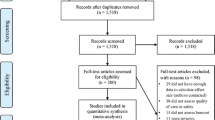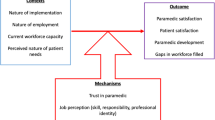Abstract
Objective
This article examines the relevance of physician impairment to the discipline of academic psychiatry.
Method
The author reviews the scientific literature, the proceedings of previous International Conferences on Physician Health, and held discussions with experts in the physician health movement, department chairs, program directors, and residents.
Results
Psychiatric illness and impairment in physicians impact academic psychiatry in several ways. Mental illnesses in physicians are being studied by some researchers, but the subject requires more scholarly attention. Training directors are interested in resident well-being and illness and how to reach out to symptomatic residents in a more timely way. Leaders in psychiatry are eager to learn the first steps in identifying colleagues at risk and the route to assessment and care. They are especially concerned about disruptive behavior in the workplace, including harassment and boundary transgressions in doctor-patient and supervisor-supervisee relationships. Academic psychiatrists wish to be more responsive to nonpsychiatrists appealing to them for guidance with impaired members of their departments.
Conclusions
Physician impairment is an emerging field of study and interest to psychiatrists in academic settings.
Similar content being viewed by others
References
A Guide to the Essentials of a Modern Medical Practice Act, 9th ed. Dallas, Tex., Federation of State Medical Boards, 2000
Myers MF: The psychiatrist’s role in the management of impaired colleagues. Directions in Psychiatry 1996; 15: 1–8
Center C, Davis M, Detre T, et al: Confronting depression and suicide in physicians: a consensus statement. JAMA 2003; 289: 3161–3166
Broquet KE, Rockey PH: Teaching residents and program directors about physician impairment. Acad Psychiatry 2004; 28: 221–225
Gendel MH: Disruptive behaviors, personality problems, and boundary violations, in The Handbook of Physician Health. Edited by Goldman LS, Myers M, Dickstein LJ. Chicago, IL, American Medical Association, 2000
Neff KE: Understanding and managing disruptive behavior in physicians, in Enhancing Physician Behavior: Advanced Principles of Medical Management. Tampa, FL, American College of Physician Executives, 2000
Gabbard GO: Psychodynamic approaches to physician sexual misconduct, in Physician Sexual Misconduct. Edited by Bloom JD, Nadelson CC, Notman MT, Washington, DC, American Psychiatric Publishing, Inc., 1999
Sarkar SP: Boundary violation and sexual exploitation in psychiatry and psychotherapy: a review. Advances in Psychiatr Treatment 2004; 10: 312–320
Schernhammer ES: Taking their own lives — the high rate of physician suicide. N Engl J Med 2005; 352: 2473–2476
Schernhammer ES, Colditz GA: Suicide rates among physicians: a quantitative and gender assessment (meta-analysis). Am J Psychiatry 2004; 161: 2295–2302
Hendin H, Maltsberger JT, Haas AP: A physician’s suicide. Am J Psychiatry 2003; 160: 2094–2097
Silverman MM: Physicians and suicide, in The Handbook of Physician Health. Edited by Goldman LS, Myers M, Dickstein LJ. Chicago, IL, American Medical Association, 2000
Frank E, Dingle AD: Self-reported depression and suicide attempts among US women physicians. Am J Psychiatry 1999; 156: 1887–1894
McCall SV: Chemically dependent health professionals. West J Med 2001; 124: 50–54
Coombs RH: Drug-Impaired professionals. Cambridge, MA, Harvard University Press, 1997
Gold MS, Frost-Pineda K, Melker RJ: Physician suicide and drug abuse. Am J Psychiatry 2005; 162: 1390
Givens JL, Tija J: Depressed medical students’ use of mental health services and barriers to use. Acad Med 2002; 77: 918–921
Rosenthal JM, Okie S: White coat, mood indigo — depression in medical school. N Engl J Med 2005; 353: 1085–1088
Levine RE, Breitkopf CR, Sierles FS, et al: Complications associated with surveying medical student depression: the importance of anonymity. Acad Psychiatry 2003; 27: 12–18
Myers MF: On the importance of anonymity in surveying medical student depression. Acad Psychiatry 2003; 27: 19–20
Hendrie HC, Clair DK, Brittain HM, et al: A study of anxiety/depressive symptoms of medical students, house staff, and their spouses/partners. J Nerv Ment Dis 1990; 178: 204–207
Hsu K, Marshall V: Prevalence of depression and distress in a large sample of Canadian residents, interns, and fellows. Am J Psychiatry 1987; 144: 1561–1566
Rao NR, Kramer M, Saunders R, et al: An annotated bibliography of professional literature on international medical graduates. Acad Psychiatry 2007; 31: 68–83
Doherty WJ, Burge SK: Divorce among physicians: comparisons with other groups. JAMA 1989; 261: 2374–2377
White RK, McDuff DR, Schwartz RP, et al: New developments in employee assistance programs. Psychiatr Services 1996; 47: 387–391
Morrison J, Morrison T: Psychiatrists disciplined by a state medical board. Am J Psychiatry 2001; 158: 474–478
Gabbard GO, Lester EP: Boundaries and Boundary Violations in Psychoanalysis. Washington, DC, American Psychiatric Publishing, Inc., 2003
Kay J, Roman B: Prevention of sexual misconduct at the medical school, residency and practitioner levels, in Physician Sexual Misconduct. Edited by Bloom JD, Nadelson CC, Notman MT. Washington, DC, American Psychiatric Publishing, Inc., 1999
Igartua KJ: The impact of impaired supervisors on residents. Acad Psychiatry 2000; 24: 188–194
Author information
Authors and Affiliations
Corresponding author
Rights and permissions
About this article
Cite this article
Myers, M.F. Physician Impairment: Is It Relevant To Academic Psychiatry?. Acad Psychiatry 32, 39–43 (2008). https://doi.org/10.1176/appi.ap.32.1.39
Received:
Revised:
Accepted:
Published:
Issue Date:
DOI: https://doi.org/10.1176/appi.ap.32.1.39




